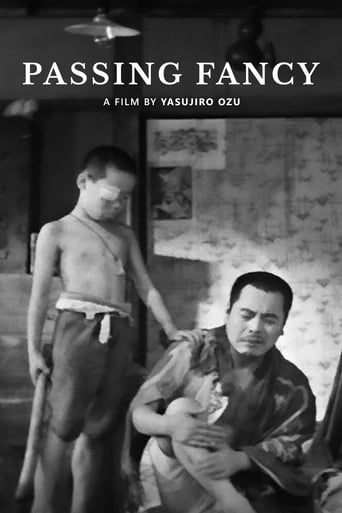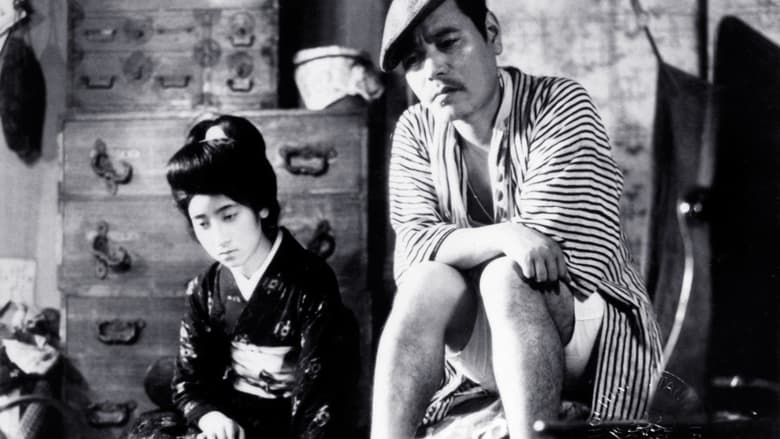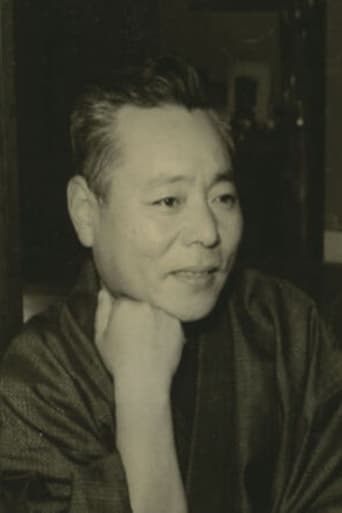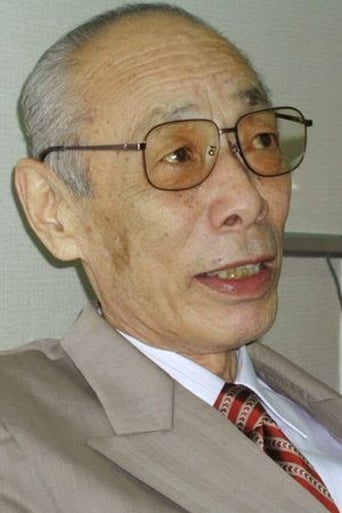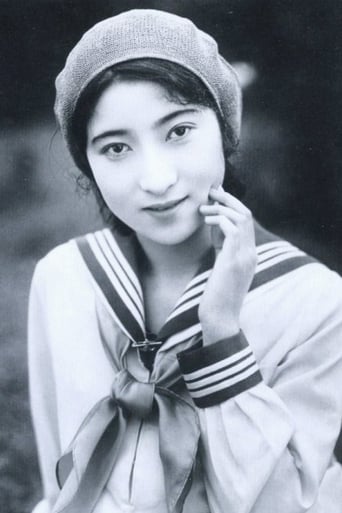Passing Fancy (1933)
In Depression-era Tokyo, a struggling middle-aged single father with a young son comes across a homeless young lady and convinces a bar owner to take her in.
Watch Trailer
Free Trial Channels
Cast


Reviews
This is a must-see and one of the best documentaries - and films - of this year.
This is one of the few movies I've ever seen where the whole audience broke into spontaneous, loud applause a third of the way in.
Excellent characters with emotional depth. My wife, daughter and granddaughter all enjoyed it...and me, too! Very good movie! You won't be disappointed.
The film's masterful storytelling did its job. The message was clear. No need to overdo.
In Passing Fancy we can see Yasujiro Ozu edging, however reluctantly, toward sound. For a silent movie it has an extraordinary number of intertitles, reflecting a stronger reliance on dialogue to carry the story and the relationships of the characters. Ozu even departs from convention on occasion to show a title card before the character has spoken the line. The film also shows more of the development of Ozu's personal style as a director than some of his contemporary silent films do: There's a greater reliance on low-angle camera-work, his so- called "tatami shots," and a more frequent use of shots of streets and buildings that don't necessarily carry information about the plot and characters but serve as something like "chapter breaks" in the narrative. But film technique aside, Passing Fancy would be remembered as one of Ozu's most charming early films. Takeshi Sakamoto plays Kihachi -- a character name the actor would retain in other films by Ozu, including A Story of Floating Weeds (1934) and An Inn in Tokyo (1935). The several characters are discrete from one another, although the Kihachi in Passing Fancy bears some resemblance to the one in An Inn in Tokyo in that they are both single parents of a son played by the marvelous child actor Tomio Aoki. (If you're not confused yet, let me also add that in Passing Fancy Aoki is billed as "Tokkan Kozo," the title of a 1929 Ozu short film based on O. Henry's "The Ransom of Red Chief" in which Aoki appeared. Oh, and that in Passing Fancy, the character is named Tomio.) Anyway, Kihachi and Tomio share rundown lodgings with Jiro (Den Obinata), who works with Kihachi in a brewery. Tomio is a good student, and he's a bit embarrassed by his illiterate and occasionally drunken father. One night, Kihachi and Jiro encounter a young woman, Harue (Nobuko Fushimi), who has just been fired from her job and is looking for a place to stay. Jiro is suspicious that Harue is "no better than she ought to be," as the saying goes, but Kihachi is smitten with her and arranges for her to live with and work for Otome (Choko Iida), a woman who owns a neighborhood bar-restaurant. Kihachi begins to spruce himself up to woo Harue, but she's more attracted to the younger and handsomer Jiro. Eventually, Otome persuades Kihachi that he's too old for Harue and that he should try to get Jiro to return her affections. Then Tomio falls ill and, following the familiar sick-child motif of many Japanese films in the 1930s, Kihachi is pressed to find a way to pay the doctor bills. Ozu's generous humor and genuine affection for his characters suffuses the film, and the splendid rapport of Sakamoto and Aoki as actors provides a special insight into the often volatile father-son relationship. There's a wonderful scene, for example, in which Kihachi slaps Tomio once too often and the boy turns around and begins to pummel his father, who submits, resulting in a deeper understanding between them. The screenplay is by Tadao Ikeda, from a story by Ozu under his pseudonym James Maki. The cinematographers are Hideo Shigehara and Shojiro Sugimoto. (charlesmatthews.blogspot.com)
Viewed on DVD. Restoration = four (4) stars. We've all been there: struggling to find the pause button in the dark on your player's remote so you will not miss anything when you are momentarily away from your viewing area. Well folks, it's not a problem with this movie. Just keep it running; when you return you will find you have missed nothing of significance! This is because nothing of significance appears to occur in this film which seems fixated on trivia, fleas (or lice), and fans. Although the actors sure try to build re pore and empathy with viewers, the director seems satisfied with the notion that trivia, fleas, and fans will carry the day. Not really! Staying with acting for the moment, it is (for the most part) first rate and you have likely seen (or will see) many of these actors before (or again)--as members of the director's acting company or, more likely, from the ranks of the studio's contract players). But the actors face a losing battle struggling with a dull script, having to scratch and fan themselves with numbing (pun intended) regularity, and less-than-inspired direction. (The plot is among the missing and the ending is flat out ridiculous!) The artificiality of a studio bound production (except for one outdoor scene) is embarrassingly obvious with small sets for both interiors and "exteriors." Cinematography suffers from the absence of deep focus. Costumes rarely change; some characters wear the same costume; it looks like the actors may have had to provide their own wardrobe. Intertitles and subtitles often occur faster than the speed of speed reading. The piano score is fine, but it's lively nature can not reanimate dead trivia. Restoration is not there yet: distracting deterioration artifacts often occur at what seems to be where reel changes took place. Criterion graphic artists are still having fun frustrating the viewer by making a game of how to turn subtitles (and the piano score) on/off. Bottom line: A padded-out featurette that goes nowhere--very slowly. WILLIAM FLANIGAN, PhD.
Yasujiro Ozu is an extremely well respected film director. While not as famous today as his countryman, Kurosawa, among those who are fans of Japanese cinema, he is practically a god. While I have loved many of his films due to their amazing artistry and great direction, I also think that overall, many of his films are a tad overrated. In other words, because SOME films are near-perfect classics (such as both versions of FLOATING WEEDS or my favorite, LATE SPRING), people often tend to see ALL of his films as having the same quality. This is true of all the great directors, as there are a devoted group of followers that see every film as great--even if the films have obvious flaws or were made before the directors learned and perfected their craft.I mention all this because although PASSING FANCY is a very good film, it's far from great--despite some amazingly positive reviews. While it's true that the Japanese film industry didn't switch to sound until very, very late compared to Western countries, shouldn't this be considered when giving out 10s to these silents? In other words, shouldn't technical merit be considered when reviewing a film? As such, I'd have to knock a point off the film. In addition, the film's plot is amazingly scant and a bit too ordinary.Now in Ozu's defense, I must say that when it comes to the ordinary, nobody does it better. Here we have the story of a hard-drinking blue collar man and his young son and there's not a lot of excitement or action...but it STILL engages the audience due to his nice touch and excellent acting. In addition, the ending is very sweet and well done--even if nothing is exactly resolved in this story of very mundane individuals.Well done and worth seeing but not exactly magical.
Takeshi Sakamoto and Tokan Kozzo team up memorably yet again as an unemployed illiterate drunk and his resentful son, in this sentimental study of working class father-son relationships. As in I WAS BORN BUT... and TOKYO CHORUS, Ozu explores how children measure their self-esteem in their parents.

